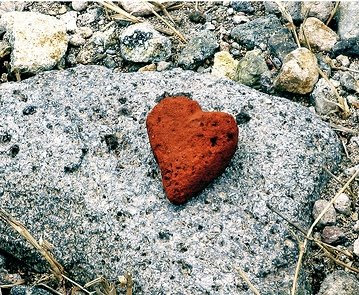Question & Answer With Chabakuk Elisha - A Hardened Heart

A Simple Jew asks:
Every day during the month of Elul we say חֲזַק, וְיַאֲמֵץ לִבֶּך ("be strong and He will give your heart courage") in Tehillim 27, and on Yom Kippur during the Viduy we say ועל חטא שחטאנו לפניך באמוץ הלב ("And for the sin that we have sinned before you through hardness of the heart.")
In the first case, hardening the heart is a positive thing since it is synonymous with courage. However, in the second case we are striking our heart with our fist and expressing our regret for hardening it. Is the difference here the difference between azus (brazenness) and azus d'kedusha (brazenness for the sake of something holy)?
Chabakuk Elisha answers:
Honestly, I don't know; however, my understanding of this parallels the concept of Tzidkus (righteousness) and Yosef Hatzaddik.
The Torah instructs us that once we settled the land of Israel, we were obligated to set up six Orei Miklot: three on the eastern side of the Jordan, and three on western side. Yet, If the majority of the Jewish people lived on the western side of the Jordan, shouldn't the majority of the Orei Miklot have been placed on that side as well? If the point was to make these strategic locations more accessible for people, it would seem counter-intuitive to place three of them on the eastern side where the area and population was much smaller! Chazal answered that this was done so, because the eastern side had a much higher murder rate. Of course, this is odd as well. Why would the eastern side – across the Jordan River – have a higher rate? After all, one generally wouldn't think that a smaller population, in farming country to boot, would be likely to have a higher crime rate.
There are many answers to this question (as is the case with almost all questions), but I'm going to focus on one: The eastern side of the Jordan was made up of three tribes of Reuvan, Gad, and half of Menashe. Interestingly, Menashe grew to be quite a sizable tribe (unlike the tribe of Ephraim – Yosef's other son – who was one of the smallest), and they ended up as the strongest tribe across the Jordan. We are told that it was the tribe Menashe that was home to the murder capital of ancient Israel. The big question is: Why them?
The Chassidic masters explain that Menashe was an heir to Yosef Hatzaddik (the righteous); and Yosef has that title because he is the paradigm of the man who has destroyed his evil inclination. Destroying the evil inclination, for those who have tried it, is no simple task; it's no job for the faint of heart. In fact, it takes a certain amount of cold-hearted ruthlessness to accomplish it – ruthlessness towards evil. Yosef possessed this, and his heirs inherited it; it was a part of their makeup. However, like all things, if we take our talents and misuse them, the results aren't pretty. Intellect, a seemingly good thing, can be used to achieve great evil; strength can be employed to cause pain; and ruthlessness can easily be channeled to carelessness towards one's fellow, or even murder. This, we are told, is one reason why the murder rate was high and the extra cities of refuge necessary – all because his descendants were heir's to Yosef's tzidkus.
This brings me back to your question, and I probably don't need to spell it out anymore, but the "hardening of the heart" that you quote above refers to this concept. We are advised and encouraged to be strong and harden our hearts towards evil. This is a good thing to do; it's not a bad characteristic to have. However, should we misapply that trait, and use our inner strength to harden our hearts against our better judgment, we have perverted it. For this we say viduy.
May G-d forgive us, and sign and seal all of us for a visibly good and healthy year, Amen!









5 Comments:
It's another interesting aspect to this that the 3 Arei Miklat over the Jordan were actually established in the time of Moshe, before they crossed the Jordan. Meaning, Moshe had a reason for assigning them in this seemingly disproportionate way, even before the murder problem developed at all!
I remember thinking once when I was reading that parsha that perhaps Moshe was able to see the "mah sh'nolad" in the settling of those tribes there in the first place, where they famously preceded their herds to their families when requesting to settle there. Moshe rebuked them for that, and we say from that fact that the order is switched later that they did tshuva. But perhaps Moshe saw the bad root that would lead later to a disproportionate murder rate long before it ever manifested in that way- the prioritization of money, or gashmius, over family and their children.
I meant to say at the end, "the prioritization of money, or gashmius, over family and their children, or at least the fact that that "hava amina" existed at all the first place, even though they did teshuva for it at the time".
Courage or obstinance is a middah. What matters to what end it is bent.
By 'Orei Miklot' one means Cities of Refuge, correct? Weren't these established to protect the unwitting
man slaughterer from the retribution of the 'blood avenger', and not for those who deliberately committed premeditated murder? Those who committed killing out of hatred, rather accidental manslaughter, were not protected from the judgement of death. Is this correct?
Schvach,
Yes, but all those who wished to protect themselves from revenge by family memebers of the vitim had to rush to one of the Orei Miklot and stay there until the outcome of the trial, etc...
Post a Comment
<< Home